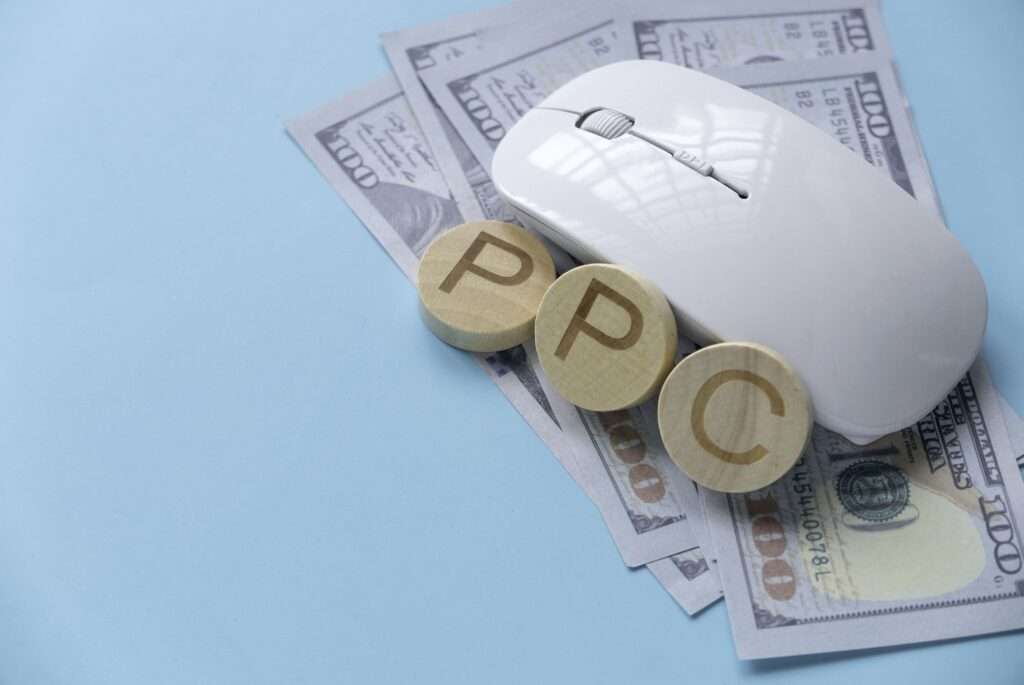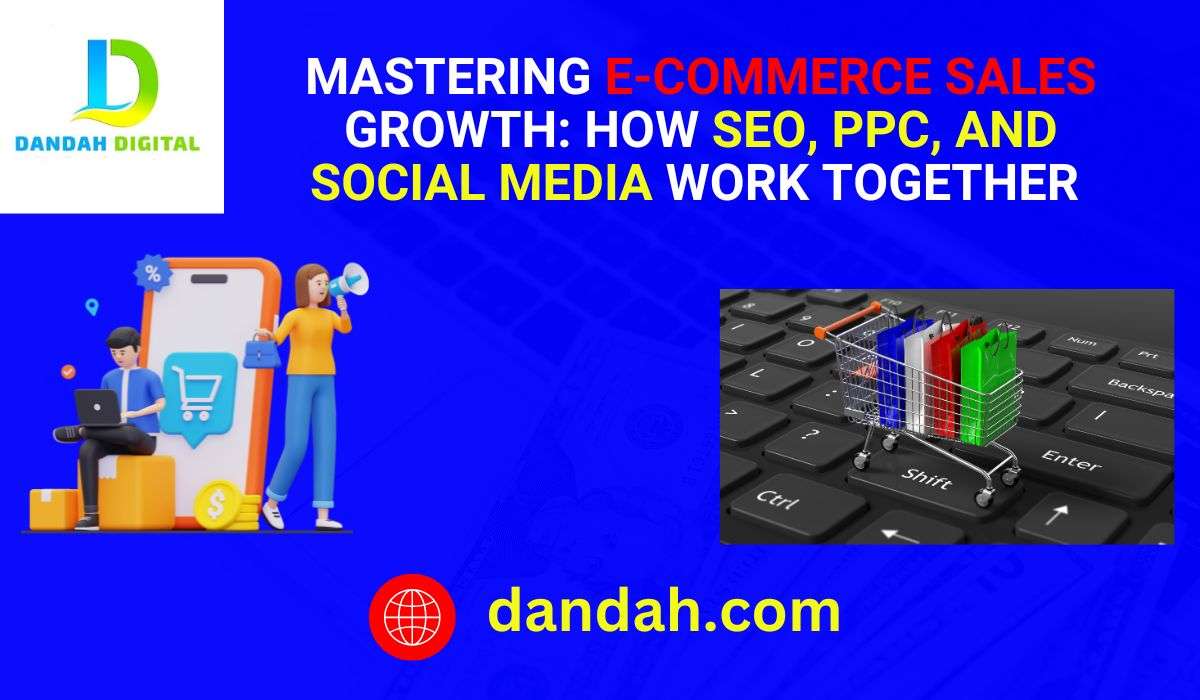After globalization, having an e-commerce portal is crucial for companies to achieve significant sales in today’s fast-paced online world, which is only possible through e-commerce.
Suppose you want to maximize and boost your e-commerce sales growth. In that case, it will take a holistic approach, including Search Engine Optimization (SEO), Pay-Per-Click (PPC) advertising and social media marketing efforts. But when you use these strategies together, your business will thrive and dominate: Maximize your visibility, boost traffic, and drive sales.
In this blog article, we will gain more insight into how these three pillars of digital marketing function together to boost the growth of any e-commerce store.
SEO: The Foundation for Organic Growth

Long-term growth depends on search engine optimization (SEO), which raises your store’s ranking in organic search results. Since organic search accounts for 53% of all website traffic, SEO is crucial for generating high-quality leads and sustaining e-commerce success. BrightEdge provides this information.
Key Components of E-Commerce SEO
Keyword Research: Knowing how your customers search is essential. Utilize SEMrush, Keyword Everywhere, Google Keyword Planner, and other tools to help you discover high-traffic keywords such as ‘best online fashion stores’ or other relevant keywords for the best affordable gadgets for students.
On-Page Optimization: Ensure that your product descriptions, meta titles and images are optimized with appropriate keywords. Also, make sure your site loads fast. You will lose almost half of your mobile users if it takes more than 3 seconds to load a page (according to Google).
Technical SEO: For technical SEO your, E-Commerce store does have not any technical issues
- Conduct regular audits for broken links.
- Work on page speed.
- Ensure mobile optimization (technical SEO).
Mobile-first indexing from Google means that how quickly your site performs on a mobile device directly affects the visibility of your website.
Content Strategy: Create relevant and valuable content about your products or industry, such as blogs, how-to guides, and case studies. According to HubSpot, businesses with blogs produce an average of 126% more leads than those without and are essential in generating organic traffic.
PPC: Driving Immediate Results with Targeted Ads

SEO is crucial to driving long-term organic growth, but on the flip side, you can use Pay-Per-Click (PPC) advertisements to get traffic and leads instantly. A WordStream report mentions that Google Ads brings an average return of $2 in revenue for every $1 spent by businesses, illustrating how it helps them with their e-commerce sales growth.
How PPC Fuels E-Commerce Success?
- Laser-Focused Targeting: PPC enables us to target particular audiences based on demographics, precise location, and search intent. For example, if you offer eco-friendly goods, you can use keywords like “buy sustainable products online” to the people searching for online products on search engines, especially Google search.
- Immediate Visibility: As previously stated, SEO could take months to produce results, whereas PPC can send visitors right away after placing your items or services on top of search engine results pages. Google Ads tools can help you find and bid for high-conversion intent keywords. *
- Remarketing: PPC allows you to reconnect with visitors who demonstrated interest but abandoned their carts. According to Invesp, remarketing can increase conversion by 70%, so it should always be a part of your PPC strategy.
- Tracking and Optimization: With Google Ads, you can monitor and assess crucial metrics such as CTR, CPA, and ROAS. This will assist you in refining your campaigns to ensure you get the most bang for your buck.
Social Media: Expanding Your Reach and Engaging Customers

There are over 4.8 billion social media users worldwide, and platforms like Facebook, Instagram, and Pinterest have become essential for e-commerce businesses. Social media marketing is crucial for boosting visibility and connecting with the ideal target market.
Social media platforms such as Facebook, Instagram, and Pinterest have over 4.8 billion users worldwide, which makes it essential for e-commerce businesses everywhere to leverage the power of social media from advertising, promotions, and customer engagement. Not only does social media marketing help with brand visibility, but you are also supposed to contact your prospective consumer directly.
How Social Media Accelerates E-Commerce Growth?

- Engagement and Community: Social media is great for direct communication from your brand to the customer. How to Use: You can make the most of it by creating interesting posts, running polls, and sharing user-generated content (UGC) to build a following for your brand.
- Influencer Marketing: Collaborating with influencers allows brands to reach a larger audience. E-commerce: Influencer marketing has an 11x higher ROI on other forms of digital and traditional media.
- Virtual Media Introduction: Social media is a nice way of selling your weblog posts, product launches, and unique offers. By sharing quality content on Instagram or Facebook, you will access many potential customers coming directly to your e-commerce site.
- Social Ads: Social media platforms’ targeting options are based on their databases of comprehensive consumer data. One example is Facebook Ads, where you can target users by interest, behavior, or even interactions on your website. When you run ads on Facebook and Instagram together, your brand is advertised in multiple places instead of just one.
Research Findings: The Power of Integrated Marketing Strategies

According to recent studies, companies that use social media, PPC, SEO, and other multi-channel marketing strategies embrace an average 24% boost in e-commerce sales. Here’s how you can greatly influence your progress by combining these three strategies:
- SEO and PPC: SEO brings you steady, long-term traffic; PPC helps capitalize on relevant opportunities. Your SEO strategy: High-converting keywords you identify in PPC data will also influence your targeting and optimization efforts for organic listing positions.
- Social Media and SEO: While social media signals don’t directly impact search engine rankings, increased sharing and engagement can lead to more website visitors, potentially resulting in higher SEO scores. Sharing and optimizing blog posts on social platforms is important to prevent Google penalties, as it can further boost SEO through backlinks.
- PPC and Social Ads: Google Ads and social media advertisements from social media platforms will target both search intent and interest-based audiences. Remarketing campaigns on each platform also increase the likelihood of conversion by keeping engagement consistent with more touchpoints.
Case Study: Success Through an Integrated Approach
Integrating SEO, PPC, and social media marketing led to a significant increase in sales for Dandah Digital, an American e-commerce company specializing in fitness equipment.
- SEO Impact: The company optimized around terms like “best home fitness equipment” and “affordable gym gear,” leading to a 35% jump in organic traffic over six months.
- PPC Strategy: They executed Google Ads for high-intent keywords (e.g., “buy home workout equipment”), which generated a 40% sales increase in the same period.
- Social Media Engagement: They worked with fitness influencers on Instagram to promote their products and encourage user-generated content. The result was a 50% increase in social engagement and very high traffic and conversions from Instagram.
Conclusion: A Holistic Approach to E-Commerce Growth
In the rapidly changing world of e-commerce, it’s essential to use SEO alongside PPC and social media marketing to ensure success. A comprehensive strategy is required to boost traffic to your e-commerce site, turn that traffic into sales, and foster brand loyalty.
Dandah Digital provides personalized digital marketing and internet plans integrating SEO, PPC, and SMM strategies for e-commerce stores and any e-commerce portal. Whether you’re attracting organic traffic, running highly effective ad campaigns, or cultivating a strong social media following, we’re here to help drive your sales growth.







